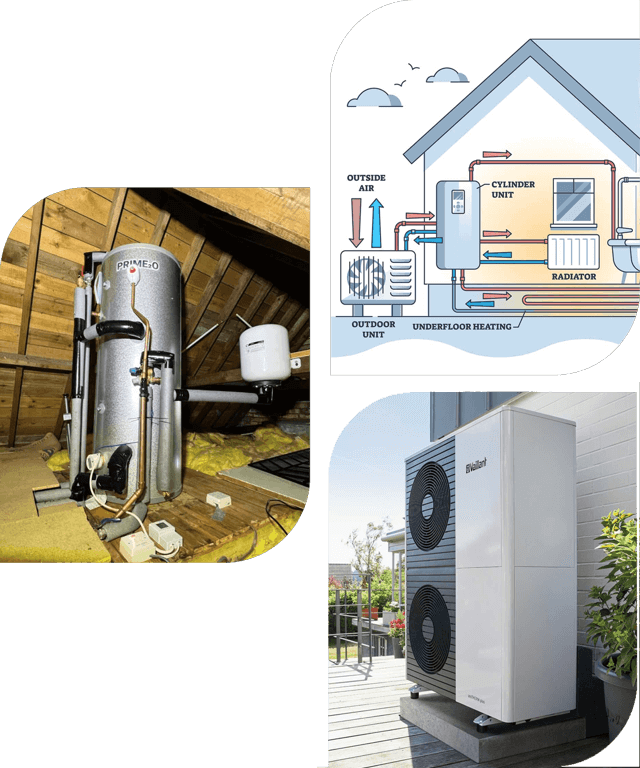Electricity is becoming increasingly low carbon, as more renewable sources are connected to the electricity grid, replacing existing gas and coal power stations. This makes a heat pump an extremely low carbon heating option, and increasingly so as our electricity grid further decarbonises.












Tens of thousands of heat pumps have already been installed across the UK, and over 1.5 million heat pumps were installed across Europe in 2020 alone. The UK Government expects that millions of heat pumps will need to be installed in homes over the next 10-15 years to meet our net zero targets.
Source: energysavingtrust.org.uk
Take a look:
ASHP Case Study: 5-bedroom, 2-bathroom Detached House, Rural Village
FAQs
Heat source pumps are a form of renewable energy technology which take the warmth from the air or ground and use it to heat the home.
Air source heating systems heat water which is then circulated around the home via radiators or an underfloor heating system. They can also be used to heat water in a storage tank for the bathroom or kitchen.
Using various pieces of technology – namely an evaporator coil full of refrigerant fluid, a type of pump called a compressor and a heat exchanger - heat pumps absorb the warmth in the air outside and release this heat into air or water, which is then distributed around the home.
They can do this even when the temperature outside is very low. Fridges work in the same way, only in reverse. They use the same technology to draw heat out of the air in the fridge, which is why the space behind fridges feels warm.
Generally, a well-insulated home with high standards of air-tightness enables you to get the most out of your air source heat pump. This is because heat pumps are most effective in homes which warm up quickly and are good at keeping heat in.
Please be aware that air source heat pumps therefore aren't for every home. A technical survey by a qualified assessor is essential before installation as it could have a detrimental effect on your electric bills if your house isn't correctly insulated.
- Lower fuel bills, especially if you are replacing conventional electric, oil and Liquid Petroleum Gas (LPG) heating
- Potential income through the UK government’s Renewable Heat Incentive (RHI)
- Lower home carbon emissions
- Can heat your home as well as your water
- Minimal maintenance required
- Can be easier and cheaper to install than a Ground Source Heat Pump (GSHP).
Yes, Government grants are available through the Renewable Heat Incentive (RHI). The installation costs can be partially or fully recouped subject to survey.
Unfortunately, grants cannot be applied for retrospectively towards existing systems. Finance can also be provided for UK residents as well as interest free loans through the Energy Saving Trust.
We also install a wide range of makes and models ranging including Midea, Samsung, Mastertherm, Clausius and Warmflow - always specified according to the heat loss requirements of your property.
We are a Business Solutions Partner with Vaillant who prides itself in delivering innovative, high performance and competitive systems with low running costs and emissions. The versatile product range is driven by advanced technology and designed specifically with customers in mind.
They manufacture a range of high-quality air source heat pumps for every home; self-contained units that only require water and electric connections. They are low maintenance, quiet to run and can be discreetly placed outside your property.